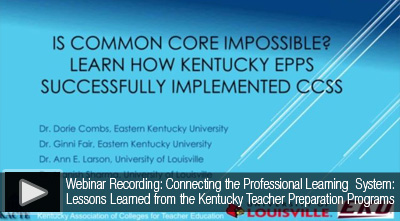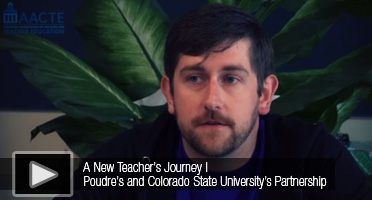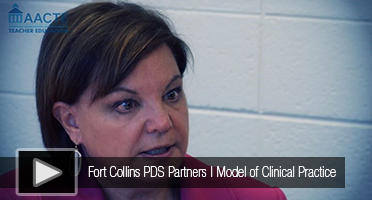05 Nov2015
By Sharon Robinson

As the Common Core State Standards (CCSS) and their kindred iterations continue to gain traction in schools around the country, staff development efforts have been bringing in-service educators up to speed, and colleges of education have been adjusting their curricula to ensure that the field’s newest professionals are also ready for the new standards. Nowhere has this shift seen greater success than in Kentucky, which was the first state to adopt and implement CCSS. A recent AACTE webinar sponsored by the Learning First Alliance’s “Get It Right” campaign highlighted the remarkable progress made by institutions in the state.
03 Nov2015
By Christine DeGregory
 If you have been inspired by the previous Research-to-Practice Spotlight videos featuring the robust partnership between Colorado State University (CSU) and the Poudre School District (PSD) in Fort Collins, don’t miss the newest installment in the series, in which school and university officials share advice on how to implement a successful clinical practice model.
If you have been inspired by the previous Research-to-Practice Spotlight videos featuring the robust partnership between Colorado State University (CSU) and the Poudre School District (PSD) in Fort Collins, don’t miss the newest installment in the series, in which school and university officials share advice on how to implement a successful clinical practice model.
Utilizing a professional development school approach, CSU and PSD have created an intentional, collaborative endeavor to achieve their shared mission of preparing highly qualified and effective teachers.
03 Nov2015
By Susan Korach
While the impact of partnerships is not yet fully understood, there is a growing body of evidence that suggests that school districts that partner with local principal training providers are more likely to leverage programmatic changes that result in principals who are better equipped to lead schools to improve student performance.
— Cheryl King, Quality Measures: Partnership Effectiveness Continuum (2014)
Last month, I had the privilege of joining colleagues from around the country to present an AACTE webinar about building school-university partnerships to support stronger preparation of school leaders. A recording of the webinar is now available here.
03 Nov2015
By Jerrica Thurman

Ed Prep Matters is featuring “Stories of Impact” to showcase AACTE member institutions with educator preparation programs that are making a positive impact in their communities and beyond through innovative practices. We are committed to sharing members’ success stories and encourage you to do the same.
Schools of education across the country take a variety of innovative approaches to improving the preparation of teachers in partnership with local schools. One example that recently won the attention of a local news channel is a lab school of Butler University (IN), which is part of the state’s largest school district, Indianapolis Public Schools (IPS). Providing its elementary students a unique opportunity to guide their own learning, this school is centered on the Reggio Emilia approach—a project-based style of teaching and learning designed to build students’ critical thinking and democratic ideas.
30 Oct2015
By Roxanne Pickle
The sixth annual edTPA Minnesota Summit, held October 7 at St. Cloud State University, focused on an issue that is essential to high-quality, comprehensive teacher preparation: securing and maintaining partnerships among higher education institutions and PK-12 school districts.
The summit brought together nearly 100 Minnesota educators to discuss strategies and best practices for creating strong bonds between educator preparation programs and the schools that will host and hire their students.
20 Oct2015
By Arlinda J. Eaton
Meaningful and purposeful collaboration among multiple agency heads is something that many states aspire to do. Georgia is among those that have been successful in forming such alliances, which provides a supportive environment for the work of the Georgia Association of Colleges for Teacher Education (GACTE).
The collaborative culture is well established in the Georgia Alliance of Education Agency Heads, which over the past decade has been successfully fulfilling its mission to collaborate, innovate, and achieve while addressing three strategic goals: (1) increase the percentage of students reading at grade level by completion of third grade; (2) increase the percentage of graduates from high school and postsecondary institutions prepared for the demands of college, workplace, a global economy, and responsible citizenship; and (3) increase the percentage of effective teachers and educational leaders. The alliance includes the state’s universities and technical colleges, the governor’s office, the Georgia Professional Standards Commission, and other education agencies.
06 Oct2015
By Michelle Kotek

A new video in AACTE’s Research-to-Practice Spotlight Series focuses on a thriving partnership in Colorado from the perspectives of novice teachers prepared in a professional development school model. This blog highlights one teacher’s experience and offers insights from his assistant principal about the program’s success.
The forward-thinking partnership between Colorado State University (CSU) and the local Poudre School District employs a professional development school (PDS) model to prepare teachers who are ready to teach on Day 1. Their classroom is the classroom: Instead of taking their classes off site at the university, prospective teachers receive their lessons and then put them into practice in the same school building—with real kids and under the tutelage of a real teacher. While the program’s elements are fairly typical, its particular success comes from each course’s clinical component and support from a robust professional community.
06 Oct2015
By Angela Maynard Sewall
In his book Innovation and Entrepreneurship, Peter Drucker advised, “Don’t try to innovate for the future. Innovate for the present.” How helpful this wisdom is for everyone in the education field, whether PK-12 or higher education! For our students and our society, the future is now. Participants in the Wallace Foundation’s Principal Pipeline Initiative have taken that advice to heart as they have worked on practical, deployable strategies to improve how principals are recruited, prepared, and supported in urban schools, right now. The six districts and multiple higher education partners already are seeing improvement in student learning as a result of their work over the past few years.
On Thursday, October 15, the second webinar in AACTE’s free series on the Principal Pipeline Initiative will explore “Building the Partnerships” to bridge the differences among institutions and programs in the pursuit of their common goals. Like the first webinar, which discussed “Laying the Foundation,” this event will feature a panel of school and university leaders who’ve participated in the initiative. Panelists will discuss inputs needed, agreements and protocols, and the impact and outcomes of building new and stronger partnerships among the key groups.
06 Oct2015
By Hannah Maes
The first webinar in AACTE’s series on the Wallace Foundation’s Principal Pipeline Initiative drew some 110 participants last month. (The second, which will also be free of charge, will be held October 15; read Angela Sewall’s post about it here.) As they heard from the initiative’s panelists about their ongoing work to reform principal preparation through collaborations among higher education institutions and school districts, the webinar participants began to echo the presenters’ enthusiasm for the model’s potential if brought to a larger scale.
24 Sep2015
By Jennifer Knox

Now through October 15, the Association of Independent Liberal Arts Colleges for Teacher Education (AILACTE) is accepting session proposals for the 2016 AILACTE Annual Meeting and Conference to be held in Las Vegas, Nevada, February 22-23, 2016.
The conference theme is “Collaboration as a Cornerstone of Teacher Education.” We seek proposals—60-minute workshops and 30-minute presentations (to be coupled with similar themed presentations)—that help us deliberate on collaboration—big and small—in teacher education.
23 Sep2015
By Sungti Hsu

As your state chapters plan fall and spring conferences, executive retreats, and other meetings, please keep in mind that AACTE staff are available to serve as speakers and presenters at meetings around the country.
22 Sep2015
By Christine DeGregory

A new video in AACTE’s Research-to-Practice Spotlight Series explores the innovative coteaching model of student teaching newly employed by Colorado State University, offering perspectives from administrators, student teachers, and a cooperating teacher. This blog highlights some of the observations they share about the model.
An innovative coteaching model is reshaping student teaching for candidates at Colorado State University (CSU), placing two teacher candidates with one cooperating teacher for a semester-long collaborative learning experience.
08 Sep2015
By Christine DeGregory

The latest video installment to AACTE’s Research-to-Practice Spotlight Series features university faculty, students, PK-12 cooperating teachers, and school leaders discussing the professional development school (PDS) model of clinical practice they use in Fort Collins, Colorado. For this blog, one of the partnership’s leaders—Donna Cooner, director of Colorado State University’s School of Teacher Education and Principal Preparation—spoke with AACTE Director of Member Engagement Tim Finklea about how this model works. Key lessons from their discussion are highlighted below.
01 Sep2015
By Sharon Robinson
This post also appears on the Public School Insights blog of the Learning First Alliance.
Educators from PK-12 schools and higher education share the goal of preparing preservice teachers in a way that develops candidates’ skills, contributes positively to student growth, and stimulates mutual renewal of schools and collegiate preparation programs. The conception of clinical experience as a few weeks of student teaching not only is antiquated but runs counter to our professional commitment to quality. Instead, today’s preparation programs are nurturing complex clinical partnerships with yearlong residencies or internships that both produce beginning teachers who are practice-ready and support a process that strengthens the schools’ capacity to deliver high-quality education for their students.
01 Sep2015
By Zachary VanHouten
In its latest effort to debase educator preparation programs, the National Council on Teacher Quality (NCTQ) is reaching out to PK-12 school districts to develop an “Honors Student Teaching” program in partnership with NCTQ. The effort seeks to replace existing student teaching commitments the districts may have with their local institutions of higher education (IHEs) over the course of 2-3 years. See this document for the details of the proposal.
A recent NPR story quoted NCTQ President Kate Walsh as saying, “It’s time for school districts to be much more insistent on what the qualifications are of teachers who enter and try to get a new job with them.” The new partnership proposal demonstrates that NCTQ intends to take charge of defining those qualifications. The proposal offers districts a set of complimentary services that include developing the knowledge and skills requirements for teacher candidate selection, as well as identifying local teacher preparation programs that would best meet the needs of the district—presumably using NCTQ’s Teacher Prep Review as a guide.














